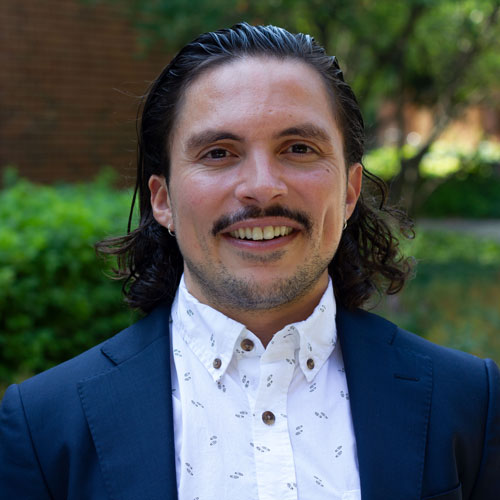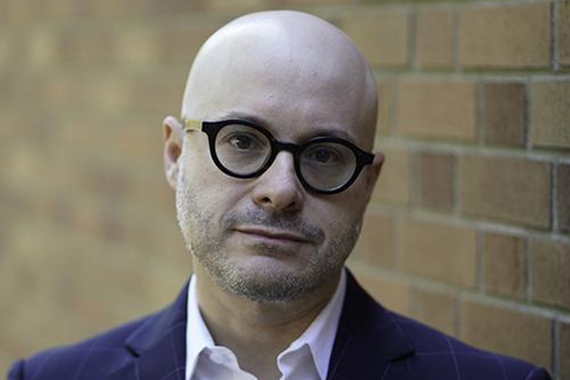Driven to Advance Health Equity
The Department of Psychology at the University of Minnesota is welcoming two new faculty members this fall—Drs. Juan Del Toro and Drexler James. While UMN Psychology already has a strong reputation in basic as well as applied psychological research that explores determinants and outcomes of health and wellness, the hiring of these two distinguished scholars expands that emphasis into the area of health equity in particular. According to Dr. Alex Rothman, a social health psychologist also in the department, as the notion of personalized medicine continues to gain traction, many disciplines that engage in health-related research are increasingly exploring the effectiveness of interventions and strategies across differences; “...beliefs, personality, social, and cultural backgrounds….when does the same intervention work effectively for everyone and when is there a benefit to tailor that intervention?” The work of Del Toro and James asks how does racism impact the health and well-being of all individuals, across their lifetimes? How do people internalize racial stereotypes or discrimination and what does this do to their physical and mental health?
Curiosity and Experience
Both noted that their experience as immigrants helped foster their initial interest in the study of health equity.

Del Toro, who moved to the US from Mexico when he was two years old, described that “growing up in California I always noticed discrepancies in my neighborhood versus where me and my family worked…[in] my communities, being Latinx and Black communities, there were a lot less resources than there were in predominantly white communities. So I always asked questions as to why that may be…[I] was always curious.” In college, Del Toro started as a pre-med student, not having been exposed to a wider variety of career options in any field, let alone in the health equity field. In his 2nd year in college, he encountered a Latinx female professor whose research examined the experiences of faculty of color in STEM fields, including their experiences with discrimination. Del Toro recalled “very naively asking her, ‘that’s research? You can do that?'” Fortunately, that professor took Del Toro on as a research assistant, allowing him to begin formally exploring inequality and how discrimination functions. In graduate school at New York University, he described that he continued to “follow his heart” by honing in on his love of working with children from a developmental perspective. Now, his research is primarily focused on examining how ethnic-racial discrimination, identity, and socialization shape human development across the lifespan from childhood to adulthood.

James too immigrated to the US, from Saint Lucia. He reflected, "as an immigrant, I was surprised that because of my ‘race’ people treated me differently. I also noticed that after coming to the US. I became hyper-vigilant to unequal treatment, which affected my mental and physical well-being.” In his undergraduate program, he worked in two research labs, one in political science examining social media relationships, and the other in psychology examining the stigma of mental illness. These experiences helped inform his decision to ultimately pursue a graduate degree in social psychology at the University of Illinois at Chicago. That early curiosity about racism and its impact on health stayed with him, though, evolving into interests in internalized racism, psychological essentialism, and racialized spaces as they pertain to health and well-being. After reflecting on and finding strong interest in the first topic, James developed a research program explicitly focused on internalized racism, which he defined as a “form of racism that leads people to internalize stereotypes about their racial/ethnic group…and/or about themselves because of their racial/ethnic group membership” (James, 2021). James now considers himself to be a Health Equity and Disparities Scholar who explores social and psychological determinants of health among minoritized groups, particularly African American adults and men of color who have sex with men, as well as the health and social consequences of biological race essentialism. With respect to biological race essentialism, James is interested in understanding how beliefs about race as biological, natural, and immutable, influence how people think about health inequality, and the extent to which they engage in health-related behaviors.
Mixed Methods
At graduate school, Del Toro received a significant amount of grounding and training in quantitative methods. Later, as a postdoctoral associate, he received additional training in “writing and articulating theory.” During his postdoctoral training, he worked with many longitudinal data sets, but the data in these sets were usually only collected one time per year. Del Toro believes his combined education and training prompted him to start thinking about data differently. For instance, what would the data look like if he instead collected it daily over a prolonged period of time? If the data indicate certain significant effects of racial discrimination on individuals, how might he also integrate biological measures? Rather than just studying the effects of racial discrimination on individuals, could he also study the effects of it using twins? He now implements classical twin/sibling designs to explore these questions, such as which factors would lead one twin to report more racial discrimination than the other and whether a discriminated twin would show a divergent trajectory relative to their non-discriminated sibling.
To engage in this work, James too uses a multi-method approach stemming from his training as an experimental psychologist, but also grounded in what he learned via his graduate minor in community health methods; “I use experimental methods, secondary data, mixed methods, and qualitative [methods].” He ultimately developed his line of research, though, from narrative experiences, specifically “how can we use people’s lived experiences to inform scientific theory and methods?” According to James, doing so involves “listening to people, reading outside psychology, and using person-driven approaches” across all of these different methods.
With regard to major theoretical and methodological challenges in the area of health equity, both noted limitations that prevent us from being able to explain all outcomes. Del Toro cited the extent to which people “still take things at face value,” failing to consider non-specific effects that were not included in published results and/or other contexts that could impact the results. He gave an example:
One [example] that comes to mind is how people definitely accept that discrimination is harmful, and I am a firm believer [that it is], but oftentimes in the studies, there are ‘nots’ in the results [e.g., negative correlations or no correlations at all]. One recent meta-analysis [explored] the effects of discrimination on adolescent development…[but]...this study only looked at published studies... [The omission of non-published findings] has implications because if you find a nonspecific effect, and it [is not reflected in] that meta-analysis, that meta-analysis may have an inflated effect - it may not hold true across all studies. That kind of thing…can block us from understanding when discrimination is harmful and when it is not. Many discrimination studies, many measures don’t look at the context of the discrimination…Is it [also perpetuated by] peers or teachers? We know that [both can have] differential [effects on] student development. Even when we study how children learn about race, we tend to focus on what they learn from parents, but not what they learn from school adults or peers, even though that’s where [children] spend most of their time.
Dr. Juan Del Toro
A limitation James cited is the ethics of seeking to demonstrate causal links between racism and health outcomes, which would traditionally be explored using experimental methods. He explained, “do you want to manipulate discrimination in the lab? Bring someone in, have them experience discrimination so you can study them, and then send them on their way?” James’ comments arguably evokes the painful history of highly unethical psychological testing done on communities of color, which is a history to hopefully never be repeated. As such, he explained that sometimes lived experiences, rather than theory, help us better understand “how people navigate the world…[it is not always necessary] to ‘prove’ something through theory that you just know.” James believes it is crucial, therefore, to also embrace grounded theory and non-experimental methods (e.g., qualitative approaches) to pursue this work in a more ethical, realistic, and robust way.
Both Del Toro and James are seeking to push back against these theoretical and methodological challenges and limitations via their own work. Del Toro is currently working on his own meta-analysis to synthesize findings from studies that examined messages parents communicate to their children to prepare them to encounter racism. Many believe that such messages serve to better protect children. He is finding some studies that do confirm that effect, but he is also findings studies that such messages are, in fact, exacerbating the effects of discrimination, as well as studies that have no significant results. According to Del Toro, his results show that “what we think is happening is not actually the case,” which then opens the door for him to examine a new way to explore this issue. For example, teenagers can also learn about racialization from their peers and adults at school; messages from them could also influence the extent to which someone is better protected or not. James, who also has an affiliation with the University of Minnesota’s Urban Research and Outreach Center (UROC) in North Minneapolis, is planning to do community-based participatory research with people living on the north side. His goal is to develop community-specific, qualitative interventions and programs to educate people about the role racism plays in their lives, how it affects their well-being, and how they can respond to improve their health attitudes and behaviors.
Navigating Controversy
The way in which this area of work is framed can vary and be controversial. Some use the term health equity, while others refer to it as the study of health disparities or health injustice. One’s framing of this work can, either explicitly or implicitly, call out a specific goal of the research. By framing this work as health disparities, for instance, the goal could be to simply reflect differences in health outcomes that might apply to any segment of the population. However, framing this work as health equity or health injustice could imply a different goal; James stated, “that there are desperate health outcomes for individuals based on their social identities that require us to act in order to create a more just and equitable society.” James talked about leveraging all three labels, for different reasons. He described, “you can’t talk about health equity without talking about justice because that’s the whole point of equity…you [also] can’t have health equity without first acknowledging disparities. And you can’t have a health equity research program without centering justice.” Currently his research does not center on justice and equity - “right now I’m focusing on the mechanisms that explain…disparities” - but he hopes to make that shift. He recognized that these three framings can be strategically explored and leveraged over time to help him achieve his ultimate goal of developing interventions that empower minoritized people to improve their health and well-being.
Del Toro discussed that he tackles the controversy around these three terms by “articulating why everyone benefits from talking about race and how everyone is affected by discrimination,” regardless of which term is used. Del Toro described that having conversations on race in school, for instance, can serve to improve all students’ experiences because it affords everyone the opportunity to learn more about their peers. He stated, “as people, we are very interactive, we are very community-focused, we want to feel supported, we want to feel a sense of community. During their teenage years, talking about race and sharing about backgrounds, it could be an opportunity for students to be able to build those relationships among each other.” With regard to articulating the effects of discrimination, Del Toro provided another example of what can happen to White students when a Black student is discriminated against by a White teacher. He stated that when a White student witnesses the discrimination, that student “can build a sense of distrust or cynicism against White teachers after that discrimination.” Del Toro believes that irrespective of the controversy that surrounds this work, racial socialization is key to calling attention to why there are inequalities today and why we should all care about it. James is of the same mind; “Everyone should get involved with [health equity]...because you’re human and it’s a human rights issue…when people are disadvantaged in society by structural issues, everyone is affected.”
Looking Forward
Now in the Department of Psychology at the University of Minnesota, Del Toro is excited to expand his research, including plugging into the significant infrastructure the Department of Psychology has with regard to twin research. Del Toro also intends to develop connections with students who “might not know that they [can] make a career out of this [the study of health equity].” He acknowledged the positive impact that role models had on him in getting to where he is today and that he wanted students to know that he intends to pay that forward; “I am here to talk with them and they can come to my office hours…I can’t wait to contribute to the diversity of the department.” He is also taking research assistants this fall for his research lab and will be teaching a topics course in the Spring semester.
James too intends to further his work, seeking to understand the psychological consequences of racism on health and well-being; “how racism gets both under the skin and into the mind…the legacy of slavery mentally and how racism affects how people of color feel about themselves and the implications for how they treat themselves…” James is driven to identify new mechanisms through which racism leads to adverse health outcomes for racially minoritized people to inform interventions that can reduce the negative effects of internalized racism - or interventions that limit internalized racism, period. James is eager to start interacting with students and advertising for his undergraduate research assistant lab opportunities. He will also be teaching a topics course this fall semester entitled, Socio-Cultural Psychology.
Del Toro and James believe that the study of health equity has much to offer us in terms of helping us to better understand our world. And the Department of Psychology, in turn, believes that these two scholars have much to offer in aid of that understanding, particularly concerning the impact of race. Theirs is a powerful and important lens to leverage in our pursuit of health equity, as well as in the broader study of human behavior.
Read Del Toro’s and James’ Research
Drexler James
- James, D. (2020). Health and Health-Related Correlates of Internalized Racism among Racial/Ethnic Minorities: A Review of the Literature. Journal of Racial and Ethnic Health Disparities, 7, 785-806. DOI: 10.1007/s40615-020-00726-6
- McCleary-Gaddy, A. T., & James, D. (2022). Skin tone, life satisfaction, and psychological distress among African Americans: The effect of stigma consciousness. Journal of Health Psychology. DOI: 10.1177/1359105320954251
- James, D. (2021a). Hardiness and attitudes towards professional healthcare services: Implications for healthcare service utilization among Black/African Americans. Health Psychology Open, 8(2). DOI: 10.1177/20551029211029157
- James, D. (2021b). Self- and group-focused internalized racism, anxiety, and depression symptoms among African American adults: A core self-evaluation mediation pathway. Group Processes & Intergroup Relations. DOI: 10.1177/1368430220942849
Juan Del Toro
- Del Toro, J., Lloyd, T., Buchanan, K. S., Robins, S. J., Bencharit, L. Z., Smiedt, M. G., . . . Goff, P. A. (2019). The criminogenic and psychological effects of police stops on adolescent Black and Latino boys. Proceedings of the National Academy of Sciences (PNAS), 201808976. doi:10.1073/pnas.1808976116
- Del Toro, J., Hughes, D., & Way, N. (2020). Inter-relations between ethnic-racial discrimination and identity among early adolescents. Child Development. Advanced online publication. https://doi.org/10.1111/cdev.13424
- Del Toro, J., & Wang, M.-T. (2020). School cultural socialization and academic performance: Examining ethnic-racial identity development as a mediator among African American adolescents. Child Development. doi:10.1111/cdev.13467.
- Del Toro, J., Fine, A., Wang, M.-T., Thomas, A., Schneper, L. M., Mitchell, C. Mincy, R., McLanahan, S., & Notterman, D. A. (2021). The longitudinal associations between paternal incarceration and family well-being: Implications for ethnic-racial disparities in health. Journal of the American Academy of Child and Adolescent Psychiatry. doi: 10.1016/j.jaac.2021.08.005
- Del Toro, J., & Wang, M.-T. (2021). The roles of suspensions for minor infractions and school climate in predicting academic performance among adolescents. American Psychologist. https://doi.org/10.1037/amp0000854
- Del Toro, J., Jackson, D. B., & Wang, M.-T. (2022). The policing paradox: Police stops predict youth’s school disengagement via elevated psychological distress. Developmental Psychology. https://doi.org/10.1037/dev0001361
- Del Toro, J., & Wang, M.-T. (2022). Online racism and mental health among Black American adolescents in 2020. Journal of the American Academy of Child and Adolescent Psychiatry. https://doi.org/10.1016/j.jaac.2022.07.004
- Del Toro, J., & Wang, M.-T. (conditionally accepted). Police stops and school engagement: Examining cultural socialization from parents and schools as protective factors among African American adolescents. American Educational Research Journal.


